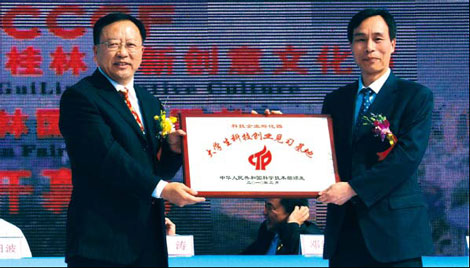News
Technology: another winning card for Guilin
By Xu Xiao (China Daily)
Updated: 2010-12-15 08:29
 |
Large Medium Small |
|
Zhang Weixing (right), deputy director of the Torch Project Center of the Ministry of Science and Technology, grants a plaque to the high-tech zone to recognize it as a base for university students to start up businesses. Huo Yan / China Daily |
There is no question about it, Guilin is a top tourist destination in Guangxi, but one with an increasing appeal to investors, thanks to its first-class high-tech zones.
To the east of the city center lies the Guilin High-Tech Industrial Zone, founded in May 1988. Back in March 1991, it was already recognized by the State Council as one of the earliest State-level high-tech zones.
It now has more than 1,000 companies, including 200 high-tech businesses, seven of them backed by Fortune-500 companies, and four backed by China's top 100 companies.
The zone has five pillar industries in electronic information, bio-pharmaceuticals, optical, mechanical and electronic integration, new materials, and environmental protection.
It mainly consists of three parts - the Qixing old town, Lidong technology town, and a tourism economic zone.
Qixing focuses on the exhibition and convention industries, coupled with tourist, cultural and residential facilities.
Lidong is the biggest of the three and the hub of the zone. In the near future, it is expected to become an environmentally friendly high-tech center, housing 150,000 people, as well as industries producing 100 billion yuan in revenues and providing 80,000 job opportunities.
The tourism zone, alongside the picturesque Lijiang River, has millions of visitors every year. It is mainly devoted to sightseeing, shopping and leisure tours but has set aside land for the software, research and creativity industries.
The high-tech zone also has a number of new industrial parks, especially for the information, new materials, machinery, creativity and pharmaceuticals industries.
The zone benefits from a number of favorable State policies because it is a part of the China-ASEAN Free Trade Area and State-level high-tech zone.
The zone has its own policies to support its companies, and a special agency that provides one-stop investor services.
The zone has hosted two international creativity and cartoon-industry shows, and hopes to attract investment and intelligent people to help develop that industry.
It aims to introduce 80 creativity companies by the end of 2011, and over the next five years, to get 350 to 400 companies in the creativity industry.
(China Daily 12/15/2010 page15)
